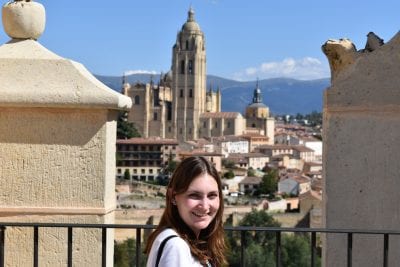Sustainability is a word that is used broadly and often, but it is a word that is difficult to boil down and conceptualize and can be defined and applied in many different ways. To me, sustainability refers to the development and cultivation of resources in a way that prolongs the life of our environment, ourselves, and the very resources that are being created. I think sustainability also refers to the concept of delayed gratification. Often, the easiest, cheapest and most immediately rewarding options are not good for the environment down the line. It can be tempting to operate in this way but the way to ensure positive outcomes down the line is by creating sustainable products that will have a lasting positive impact. While this costs more money and time, it is important to consider that sustainability is usually the better and more cost-effective option down the line to avoid expensive damage in the future due to poorly constructed products.
Category Archives: intro
Blog Post #1
The Mathematics of Sustainability is a very interest concept for me. Ordinarily, I found math to be quite dull and linear. I enjoy looking at the world and conceptualizing various causalities for events that do not follow a simple equation. When it comes to studying sustainability however, it adds a crucial element in dissecting why various world leaders or other political actors do the things they do. For example, studying the sustainability of OPEC producing countries reveals a large percentage of these countries acting in accordance towards sustaining their oil outputs. I find this fascinating, because these economies depend almost entirely on the export of oil and natural gasses. Studying how the methodology and strategic actions taken by countries all across the world to preserve and sustain their resources and themselves, highlights a considerably important variable that would normally go unnoticed.
As we move towards 8 billion people, the calculations of sustainability become that much more critical. Resources such as water, electricity, natural gasses, Coffee, and Chocolate will all see their expanded status in luxuries or delicacies. There is no question that humanity will reach Earth’s carrying capacity (barring disease or war) so the main question that arises concerns the preemptive planning. How can humanity as a species brace for the increasing scarcity of resources? How do we choose to whom to allocate these resources too? Both of these questions represent powerful dilemmas but allude to vast importance of thinking in sustainable terms. For this reason, I am excited to pursue and educate myself on the mathematics of sustainability. 
Blog Post #1
The word sustainability has been used frequently throughout my life. My father has worked in the waste business my entire life and has instilled the values of conservation and protection towards our environment. His company has always revolved around way to reduce waste from communities by picking up garbage more than once per week, as well as pushing for a stronger urge towards recycling. At a young age, my father would bring me to the transfer stations and teach me about the importance of recycling. He would take me to the landfills in South Florida to show me how waste can be broken down over time or unable to be broken down. This led to his desire to lead a more sustainable life rather than continue down an environmentally destructive path. The knowledge that my father has given me has shown me the difference that we can make, as well as the fact that there is still time to fix the mistakes that we have made. Throughout my entire life, I have tried to live with a sustainable mindset while doing my part in making sure to reduce waste. 
Blog Post #1
Union has exposed me to sustainability in a way I had never been previously. Union’s commitment to sustainability has stimulated my interest in environmentalism and has encouraged me to reduce my own carbon footprint. Since coming to Union I am more cognizant of my own environmental practices and habits and I continue to recycle, compost, use a reusable water bottle, and support Octopus’s Garden and Ozone Café. While my relationship with sustainable living is a relatively new one, I am excited to learn more about how math relates to global issues such as agriculture and climate change. As a Psychology and Spanish double major, I have had little exposure to environmental studies in an academic setting, but I look forward to exploring sustainability through a quantitative lens and learning about how I can help to better the future of our planet.
Blog Post #1: What Sustainability Means to Me
What sustainability means to me has changed since coming to Union and being given the opportunity to study abroad. This past spring, I studied abroad in Florence, Italy. In Florence, I lived with a host family whom was extremely environmentally conscious. Italy but also Florence in particular has severe air pollution issues, which have affected the health of many citizens. Their lack of clean air has lead to government intervention in order to regulate the amount of water households can use and the amount of time the heat can be left on. This has been done to improve some of the environmental problems that have left Florence with the worst air quality in all of Italy. Not only that, but my family made it their mission to compost, recycle, and minimize waste constantly. This is something that has also been shown to me at Union. The Students here have made it their mission to make composting and recyclying a part of our daily lives with composting and recycling bins located all throughout campus. While abroad, I became more aware of the importance of a sustainable lifestyle in order to reduce my own carbon footprint.
Intro
Sustainability to me means a functional, ongoing way for systems to work. I interacted closely with research in sustainability when I studied abroad on the New Zealand mini-term in the December of my Sophomore year at Union. I explored sustainability through the lens of energy resources, comparing renewable and non-renewable forms of energy, since New Zealand is the leader in renewable energy use. New Zealand has taken steps to use resources such as geothermal energy production, wind energy, hydro energy, and solar energy to cut down on carbon dioxide emissions, as well as to create a more sustainable way of living. I think that sustainability is something that is really commonly thought about throughout New Zealand culture, more so than in American culture, in my opinion. I think due to this way of thinking as well as due to the actions of politicians creating the Resource Management Act in New Zealand, their way of life has become very sustainable as compared to less sustainability in American culture. Sustainability is important to me to keep our society running and the Earth clean for generations to come, including and especially for my cutest cousin Grayson, seen below.
Here is the link to learn about the Resource Management Act of 1991.
Intro Post
I grew up on a farm, in the middle of nowhere, in rural Maine. So nature and the environment have always been concerns of mine ever since I was a young child, most the time completely subconsciously, but my parents raised myself and my other two siblings as what some would call “feral children”. We spent most of our time outside with animals and with dirt under our fingernails. The importance of our Earth was drilled into us at a very early age, especially the idea that we must care for it. Our little farm almost completely sustained my family through the spring and summer months. My father, who works in finance, constantly speaks about some economic downfall happening in the world. His words? “I’ve predicted the sky is falling for years and people just now started to look up”. So my childhood was built around the care for the environment and the economy.
My understanding of sustainability is the image of a circle. In a perfect world, waste from humans as a species would benefit other species, but that won’t work or be executed for a number of reasons. Sustainability, at this point to me, just means that we don’t make the environment or the economy any worse. At this point I think that’s the best we can hope for. We, as a generation, have been left a complete mess. Hopefully, we’ll figure out how to clean it up little by little; however, perhaps a major road block we face is the corporate greed that seems to blanket the earth. A small example of this is an article in Bloomberg which speaks about a Harvard study that determines the cost of Carbon capture centers as less, and more efficient, than the cost and efficiency of an electric car. This study has been conducted since 2015, but we’ve heard nothing of it. Why? Why have we been kept in the dark about something that could yield almost immediate results to our environment? The idea of sustainability needs to involve questions on our part. A lot of questions.
I honestly don’t believe that there will ever be a day where there will be zero waste, zero pollution, and so forth. I do think that there can be a drastic decrease however. Just like a lot of people who want to help the environment, my beliefs don’t always line up with my everyday rituals concerning what I eat and use. However, I’m really hoping that doing the math behind sustainability will embolden me into practicing sustainability in my life. My younger sister chose the picture… 
Post #1
The concept of sustainability seems like an simple idea but in theory a very difficult task to bring into fruition. Sustainability is the balance between the abundant resources produced by nature and the rate of consumption by humans. Growing up in Cape Verde the idea of sustainability was important for resources where limited and the teachings of resource consumption was common.  The environment is something really important to me because I grew up surrounded by the ocean with beautiful beaches and spent most of my time exploring nature. I have spent a few summers working with a non profit organization called Save the Harbor Save the Bay, where we educated children on that dangers of pollution and how improper disposal of natural resources could negatively damage the ocean. The planet is heading in a negative direction when it comes to the conservation of natural resources, for money is an important factor that dictates the decisions about climate change in the future. The population continues to grow and the resources being used are only amounting to higher numbers, but there are other alternative resource of energies that can be used. Creating a healthy world where energy can be used without the harming of the planet would be amazing for the future generations will have the opportunity to experience joy the wonders of nature.
The environment is something really important to me because I grew up surrounded by the ocean with beautiful beaches and spent most of my time exploring nature. I have spent a few summers working with a non profit organization called Save the Harbor Save the Bay, where we educated children on that dangers of pollution and how improper disposal of natural resources could negatively damage the ocean. The planet is heading in a negative direction when it comes to the conservation of natural resources, for money is an important factor that dictates the decisions about climate change in the future. The population continues to grow and the resources being used are only amounting to higher numbers, but there are other alternative resource of energies that can be used. Creating a healthy world where energy can be used without the harming of the planet would be amazing for the future generations will have the opportunity to experience joy the wonders of nature.
Post #1
Being from a very rural part of the country, I was raised in the midst of nature. My small, isolated town in south-central Idaho is nestled in the Wood River Valley which cuts through four major mountain ranges and soars at its 6,500 foot elevation above sea level. The air is thin and crisp and the landscape is simply spectacular. About 20 minutes north of my house, the alpine region of Idaho begins with thick pine forests, mountain peaks that are covered with snow even on the hottest summer day, and is inhabited by moose, bears, wolves, bobcats, bald eagles and many others. However, traveling about 35 minutes south of my house, the high desert region stretches down to the Nevada border. The sagebrush covered camas prairie stretches for miles and is home to cacti, rattle snakes, scorpions, jackrabbits and coyotes. Living in between these two very distinct habitats causes my family and the other members of my community to constantly experience severe weather events. We have all had to evacuate our homes four separate times due to wildfires. Houses have been washed down the river during the spring runoff severe flood season and lives are lost every winter as a result of catastrophic avalanches. We all have a healthy respect of the nature that surrounds us and fully understand how dangerous the frontier lifestyle can be. Because of our severe weather events and the fact that we are so remote, (the nearest airport is 3 hours by car over through the prairie), we are raised to from infancy with sustainable practices. For example, in my home, we have no heat or air conditioning. During the sub-zero alpine winter, we chop wood and burn fires in our fireplaces to keep warm. We hunt for much of our own meat and we partner with local ranchers to get what we cannot grow ourselves. Everything is a whole community effort; that is how we survive the harsh conditions. We live because of the land, not in spite of it. Sustainability is a way of life for us because it is a necessity and we cherish our culture and system. I feel that now, more than ever, it is important for everyone around the world to be more conscious of their environmental impact and inform themselves on ways that they can reduce their footprint. Sustainability is incredibly important to me and my hope is that sustainable practices will become more common and widely used everywhere. 
Blog Post #1
As a Political Science major, the goal is to understand how states are created, how they operate, and the effects that policy decisions have on society as a whole. Oftentimes environmental sustainability and global climate change become politicized issues that are now partisan in nature. This is unfortunate, as sustainability is deeply intertwined with the quality of life that people have. From my understanding sustainability relates to maintaining the makeup of our planet and ensuring that there are enough resources to support human life. The modern world often threatens sustainability, and it is important for people to understand these threats; whether it be from climate change, or lack crops and food. In the Spring I took a geology class that covered climate change and I feel as though I at least have a basic understanding of the issue. Another course that I’ve taken that relates to the issue of sustainability was Human Security. Human Security is a concept brought forth by the United Nations that describes ways in which governments worldwide can enact policies that give people the ability to live lives that are secure from the threats of violence, hunger, and poverty. Last winter break I had the opportunity to study in India. When I was there, our group saw firsthand at how some of these issues can directly effect quality of life. In taking this course, I hope to brush up on my math skills a bit and garner knowledge about how people and governments address the issue of sustainability worldwide. 




